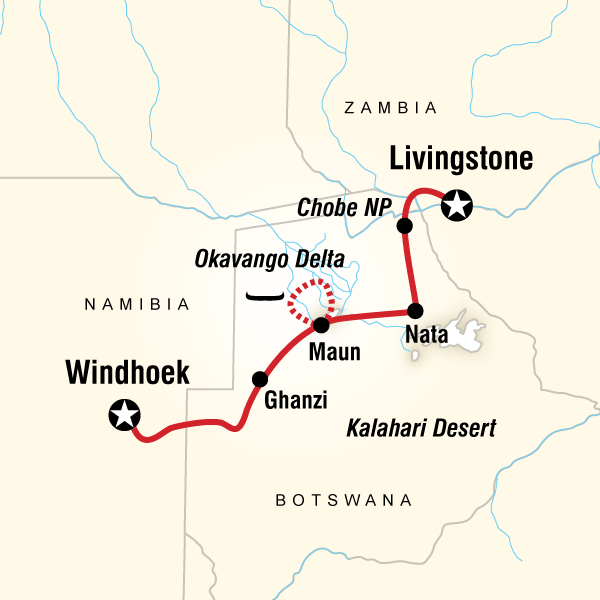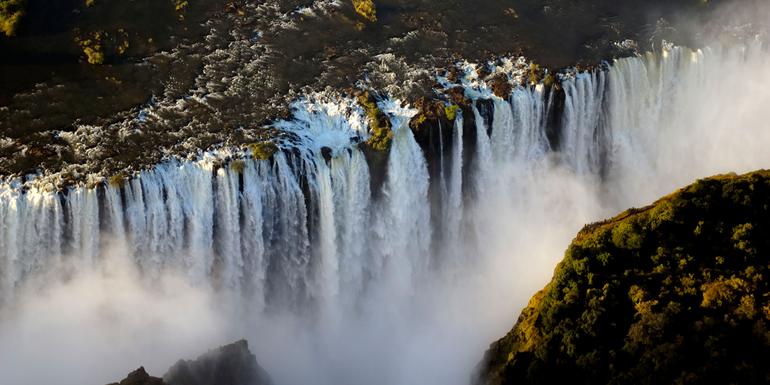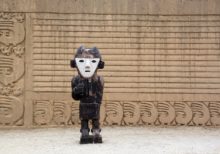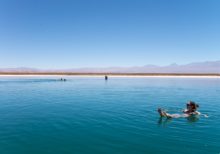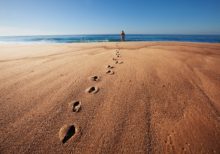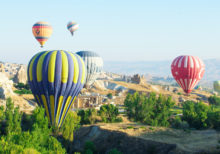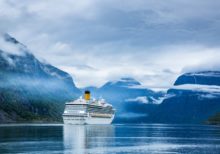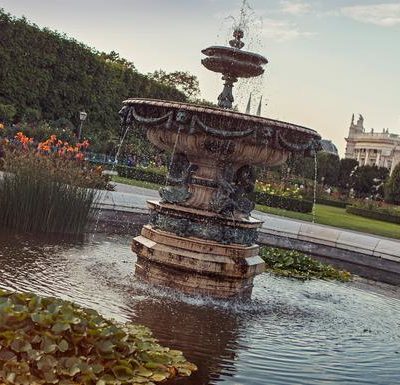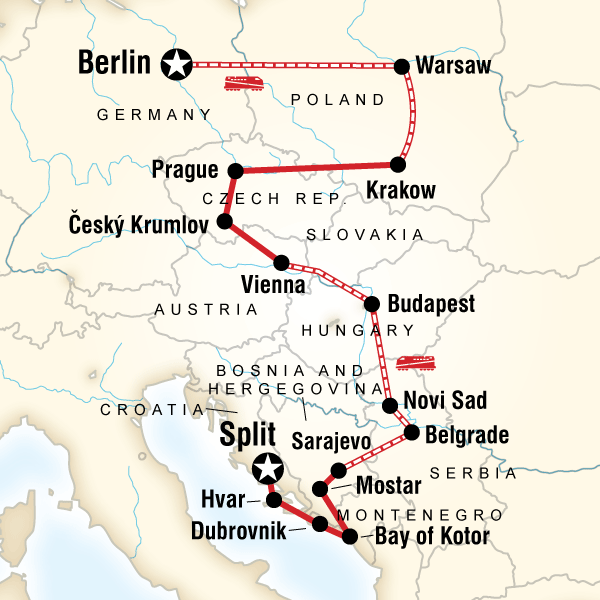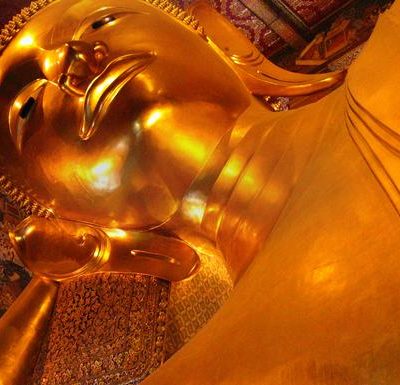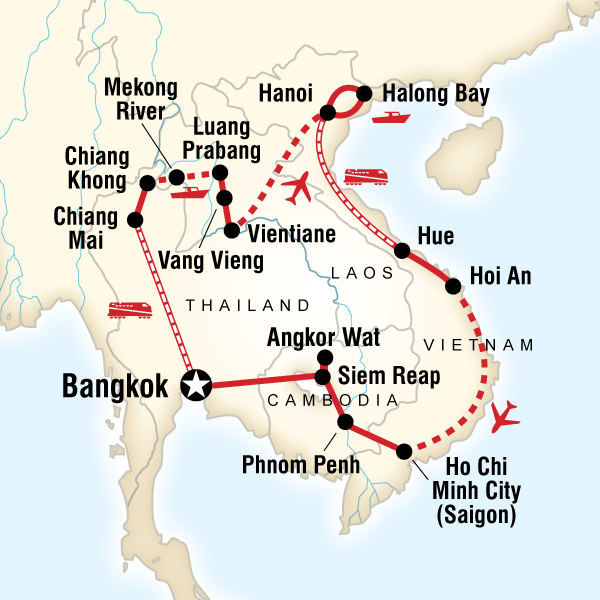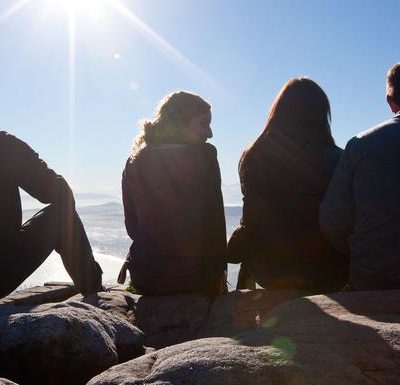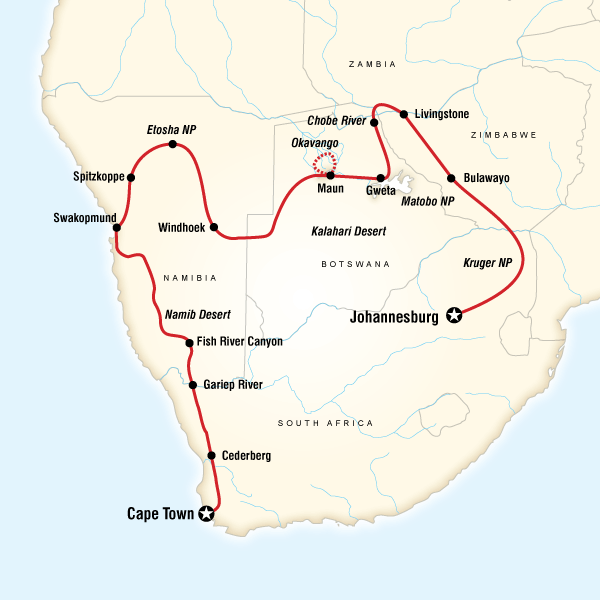More Information
What’s Included
Kalahari Desert visit. Okavango Delta excursion with entrances, game walks and dug-out canoe trips. All transport between destinations and to/from included activities.
Highlights
Witness the immense Kalahari Desert and Victoria Falls, experience game walks and wilderness camping, float past hippos in a dug-out canoe, learn about the San Bushmen, search for the Big Five
Dossier Disclaimer
The information in this trip details document has been compiled with care and is provided in good faith. However it is subject to change, and does not form part of the contract between the client and the operator. The itinerary featured is correct at time of printing. It may differ slightly to the one in the brochure. Occasionally our itineraries change as we make improvements that stem from past travellers, comments and our own research. Sometimes it can be a small change like adding an extra meal along the itinerary. Sometimes the change may result in us altering the tour for the coming year. Ultimately, our goal is to provide you with the most rewarding experience. Please note that our brochure is usually released in November each year. If you have booked from the previous brochure you may find there have been some changes to the itinerary.
VERY IMPORTANT: Please ensure that you print a final copy of your Trip Details to review a couple of days prior to travel, in case there have been changes that affect your plans.
Itinerary Disclaimer
While it is our intention to adhere to the route described below, there is a certain amount of flexibility built into the itinerary and on occasion it may be necessary, or desirable to make alterations. The itinerary is brief, as we never know exactly where our journey will take us. Due to our style of travel and the regions we visit, travel can be unpredictable. The Trip Details document is a general guide to the tour and region and any mention of specific destinations or wildlife is by no means a guarantee that they will be visited or encountered. Aboard expedition trips visits to research stations depend on final permission.
Additionally, any travel times listed are approximations only and subject to vary due to local circumstances.
Important Notes
1. This is not a physically demanding journey; however, travelling can be difficult, with long drives and poor road conditions at times. Despite this, most clients feel that the diversity of the African landscape, countries, culture and wildlife are all well worth the experience. We use a comfortable and safe air-conditioned vehicle for the long drives.
2. Please note that this tour combines with other G Adventures tours. As such, the staff and some travel companions on your tour may have previously been traveling together with G Adventures, prior to Day 1 of your tour. Likewise, some staff and travel companions may be continuing together on another G Adventures tour, after your trip concludes.
3. It is compulsory to show a valid Yellow Fever Certificate if you are travelling to Botswana from a Yellow Fever endemic country. Entry into Botswana when travelling from the following countries (but not limited to) will require a Yellow Fever Certificate: Angola, Benin, Burkina Faso, Burundi, Cameroon, Central African Republic, Chad, Congo, Democratic Republic of the Congo, Republic of the Cote d’Ivoire (Ivory Coast) Equatorial Guinea, Ethiopia, Gabon, Gambia, Ghana, Guinea Zambia, Guinea-Bissau, Kenya, Liberia, Mali, Mauritania, Niger, Nigeria, Rwanda, São Tomé and Príncipe, Senegal, Sierra Leone, Somalia, Sudan, Tanzania, Togo, Uganda, Argentina, Bolivia, Brazil, Colombia, Ecuador, French Guiana, Guyana, Panama, Paraguay, Peru, Suriname, Trinidad and Tobago, Venezuela
Group Leader Description
On this tour, you will be accompanied by a group Chief Experience Officer (CEO) and an expert driver. The Chief Experience Officer (CEO) will be the group manager and leader. All of our leaders in southern Africa are registered and licensed tourism guides, meaning they’ve studied to have a broad knowledge base of the region’s history, cultures, and wildlife, and are legally certified to lead/guide tours in the regions visited. Most of our leaders in the region are from South Africa, though it may be possible that you’ll have a leader from another country in the southern African region.
As the group manager and leader, the aim of the group leader is to take the hassle out of your travels and to help you have the best trip possible. They will provide information on the places where are travelling, offer suggestions for things to do and see, recommend great local eating venues and introduce you to our local friends. He/she will take care of the small things so you can concentrate on enjoying your adventure. In addition, as an integral part of the team, your driver is skilled and experienced driver who has intimate knowledge of the vehicle and routes travelled.
We also use local guides where we think more specific knowledge will add to the enjoyment of the places we are visiting.
Group Size Notes
Max 18, avg 14.
Meals
Eating is a big part of travelling. Travelling with G Adventures you experience the vast array of wonderful food that is available in southern Africa. On this tour, we provide only a few meals for you and your group members, so as to give you the maximum flexibility in deciding where, what and with whom to eat. It also gives you more budgeting flexibility in you choices. Our groups tend to eat together to enable you to taste a larger variety of dishes and enjoy each other’s company. There is no obligation to do this though – while in the larger centres, your CEO will be able to suggest favourite restaurants during your trip.
Your CEO prepare the meals included in the Okavango Delta, arranging to purchase the foodstuffs before our bush camping excursion begins. Breakfasts will generally be cereals, if time allows a warm breakfast may be prepared. Lunches will be light meals such as sandwiches and/or salads. All evening meals will be freshly-prepared hot meals, and will consist of a variety of continental and local dishes.
For the included meals, vegetarian meal requests and other dietary requirements need to be specified prior to arrival.
Transport
Air-conditioned touring vehicle, walking, mokoro, ferry
About our Transportation
For all of our standard class trips in southern Africa, including this tour, we use a private local bus for the journey. With air conditioning, and sliding windows, this style of transportation is a comfortable way to travel through the region. In addition, even with a full group of 18 travelers, there will be extra space for the benefit of the group. Having our own private vehicle throughout the tour allows us the flexibility of making stops when needed. In addition, we are able to travel to out-of-the-way locations where public transportation does not reach.
Road conditions in the region can range from good to very poor. As such, we slow our traveling speed in the rough spots and enjoy some sand and bumps en route – something which is of course part of the adventure of traveling in Africa!
In the Okavango Delta, we leave our bus behind and explore in the area in mokoros – traditional dug-out canoes. The mokoros usually seat 2 people and are handled by ‘polers’ – so named as they move the mokoro forward by using a very long pole pushed into the ground under the water. This is a relaxing and peaceful way to take in the fascinating environment and wonderful scenery of the delta.
Solo Travellers
We believe single travellers should not have to pay more to travel so our group trips are designed for shared accommodation and do not involve a single supplement. Single travellers joining group trips are paired in twin or multi-share accommodation with someone of the same sex for the duration of the trip. Some of our Independent trips are designed differently and single travellers on these itineraries must pay the single trip price.
Accommodation
Hotels (2 nts), bushmen hut (1 nt), lodge/chalet (2 nts), basic camping (1 nt), adventure tents (1 nt).
My Own Room
About Accommodation
Hotel
2 nights in comfortable twin rooms with en suite or shared facilities.
Lodge
1 night in standard rooms with en-suite facilities.
Cabin/Huts
1 night are spent in simple Hut. Rooms are twin or single with shared facilities.
Adventure Tents
2 nights are spent in simple Dorm/Adventure tents. Rooms are twin or single with shared facilities.
Basic Camping (participative, please bring your sleeping bag)
1 night is spent in pitched tents in the Delta with very basic facilities (no shower, dig-out toilet). Tents are twin.
Joining Hotel
AUAS CITY HOTEL
Centaurus St.
Windhoek, Namibia
TEL: +264 61 239 768
EMAIL: acl@mweb.com.na
WEBSITE: www.auascityhotel.com
Joining Instructions
Upon arrival in Windhoek, arrival transfers are not included. Please make your way to the joining hotel. Windhoek Hosea Kutako International Airport is about 40 km from downtown. There are a variety of ways to get into the city.
Taxi: When arriving at the international terminal, walk straight ahead and out the doors and just to your left you will see sedan vehicles which are the taxis. The amount should be $250N but agree the price before getting into the vehicle.
Shuttle: When arriving at the international terminal, walk straight ahead and out the doors and just to your left you will see a mini-van. This is the shuttle service to Windhoek/Windhoek hotels/guesthouses and departs when the vehicle is reasonably full (Cost is $120N payble in South African Rand 1ZAR=$1N).
Pre-arranged transfer: Upon walking out of the international arrivals, look for a transfer person on with a G Adventures sign and your name. Ask him/her what hotel he/she will take you to (do not volunteer this information). Then present your passport for proof of identity.
A brief departure meeting will be held in the hotel reception area in evening on Day 1 of your tour. Upon arrival look for information from your CEO regarding meeting time and also the rest of the tour.
The tour departs Windhoek on Day 2 in the morning.
Arrival Complications
We don’t expect any problems, and nor should you, but if for any reason you are unable to commence your trip as scheduled, as soon as possible please contact your starting point hotel, requesting that you speak to or leave a message for your CEO (if you are not on a group tour please refer to the emergency contact details provided in this dossier). If you are unable to get in touch with your leader, please refer to our emergency contact details. If you have pre-booked an airport transfer and have not made contact with our representative within 30 minutes of clearing customs and immigration, we recommend that you make your own way to the Starting Point hotel, following the Joining Instructions. Please apply to your travel agent on your return for a refund of the transfer cost if this occurs.
Emergency Contact
Should you need to contact us during a situation of dire need, it is best to first call either the G Adventures Local Representative (if one is listed below) or our G Adventures Local Office. If for any reason you do not receive an immediate answer, please leave a detailed message and contact information, so they may return your call and assist you as soon as possible.
AIRPORT TRANSFER
If you have purchased an arrival through G Adventures or if an arrival transfer is included in the cost of your tour, please note that:
Your arrival transfer has been arranged based on flight information provided to us. If you are advised of a flight schedule change within 48 hours of your scheduled arrival time, we will do our best to rearrange your arrival transfer however we cannot guarantee this. If your arrival transfer does not arrive within 30 minutes after you have exited the arrivals area please take a taxi to your start point hotel.
EMERGENCY CONTACT NUMBERS
G Adventures Local Operator (South Africa)
After Hours Emergency number:
From outside South Africa: +27 82 5757 434
From within South Africa: 082 5757 434
If you are unable for any reason to contact our local office, please call the numbers listed below, which will connect you directly with our 24 hour Sales team, who will happily assist you.
Toll-free, North America only: 1 888 800 4100
Calls from UK: 0844 272 0000
Calls from Germany: 01805 70 90 30 00
Calls from Australia: 1 300 796 618
Calls from New Zealand: 0800 333 307
Outside North America, Australia, New Zealand, Germany and the UK: +1 416 260 0999
What to Take
You will be on the move a lot, so our advice is to pack as lightly as possible. Your baggage should be clearly labelled and restricted to one soft compact suitcase (please avoid a hard-top case), or sports bag, maximum 15kg, plus a daypack. Luggage limits on airlines are strictly enforced and space on vehicles is limited. Porters are not often available, so be prepared to carry your own bags. It is important to pack clothes for warm days and cool evenings, as well as a warm jacket for early morning game drives. A set of smart casual clothes is also advisable. A set of smart casual clothes is also advisable. During the winter months (May to October), the temperatures can get quite cold in Botswana. It is wise to bring plenty of layers for cool mornings and evenings. A set of smart casual clothes is also advisable. Please don’t forget to bring your sleeping bag for the two nights spent in pitched tents in the Delta.
Checklist
-Documents
-Passport
-Insurance info
-Flight info
-Cash, credit and debit cards
-Cash in USD
-Vouchers and pre-departure information
-Required visas or vaccination certificates
-Weather-appropriate clothing
-Fleece or wool jumper/jacket
-Windproof/waterproof jacket
-Small towel and swimwear
-4 shirts/t-shirts, cool and breathable
-Long-sleeved shirt or sweater for evenings
-1 pair of shorts
-2 pairs of long trousers
-1 pair hiking pants/track pants
-Comfortable shoes
-3-4 Season sleeping bag and liner
-Pillow (for camping)
-Sport sandals
-Sun hat, Bandana
-Sunblock
-Sunglasses
-Watch or alarm clock
-First-aid kit (should contain Lip balm with sunscreen, Aspirin, Ibuprofin , Malaria pills, bandaids/plasters, tape, anti-histamine, Antiseptic cream, Imodium or similar tablets for mild cases of diarrhoea, rehydration powder, insect repellent, extra prescription drugs you may be taking)
-Toiletries (biodegradable)
-Toilet paper
-Day pack
-Camera with extra memory cards and batteries
-Personal Entertainment
-Binoculars
-Waterproof backpack cover
-Flashlight/Torch
-Outlet adapter
-Insect Repellent
-Moneybelt
-Antibacterial wipes/gel
-Reusable water bottle
-Pocketknife
Laundry
Please note that you will be on the move a lot, and as such there will not be a lot of time for same-day laundry service. Please ask your guide/CEO to arrange if any laundry needs to be done, so that he / she can advise or make arrangements for you.
Visas
All countries require travelers to have a valid passport (with a minimum 6 months validity), and you are required to acquire the entry visas for each of the countries visited.
Please double check with your agent and/or visa agent what the visa requirements is for each country that you will be traveling to. Some countries do require that you get your visa before arrival. If you show up at a border and should you not have the required visa you will be denied entry to the country and be send back to the closest embassy/high commission to get the visa. All arrangements and expenses for that will be at your own cost. The CEO will assist you with travel arrangements but will not be able to accompany you. You will also have to catch up with the group at their next destination at own cost.
We have been experiencing a lot of problems with people that need visas for Namibia and Malawi. Namibian and Malawian visas is not available at the border, so please make very sure if you do need a visa before arrival.
The information provided here is to be used as a guide only. Please consult with the relevant embassy or your travel agency before you travel. We cannot take any responsibility whatsoever for the use of this information.
Namibia
http://www.namibia.org.za/consular.htm
http://www.namibiatourism.com.na/visas/
Visas cannot be obtained on arrival.
FOREIGN NATIONALS EXEMPTED FROM VISA REQUIREMENTS WHEN TRAVELLING TO NAMIBIA
Angola, Australia, Austria, Belgium, Botswana, Brazil, Canada, Cuba, Denmark, Finland, France, Germany, Hong Kong, Iceland, India (Diplomatic and Official Passport up to 3 Months), Ireland. Italy, Japan, Kenya, Lesotho, Lienchtenstein, Luxemburg, Malaysia, Macau (SAR), Malawi, Mauritius, Mozambique, New Zealand, Netherlands, Norway, Portugal, Russian Federation ( Including States of the former U.S.S.R), South Africa, Singapore, Spain, Swaziland, Sweden, Switzerland, Tanzania, United Kingdom, United States of America, Zambia, Zimbabwe.
Other categories must obtain VISAs
Visa costs
Please inquire with your agent or closest embassy.
Botswana
http://www.botswanaembassy.org/index.php?page=visa-consular
http://www.botswanatourism.co.bw/entryFormalities.php
Visas cannot be obtained at the border.
Countries that does not require a visa for Botswana
Antigua & Barbuda, Argentina, Australia, Austria, Bahamas, Barbados, Belgium, Belize, Brazil,Brunei Darussalam, Bulgaria, Canada, Chile, Costa Rica, Croatia, Cyprus, Denmark, Dominica, Dominican Republic, Estonia, Fiji, Finland, France, Gambia, Germany, Greece, Grenada, Guyana, Holy See, Hong Kong, Hungary,Iceland, Ireland, Israel, Italy, Jamaica, Japan, Kenya, Kiribati, Lesotho, Liechtenstien, Latvia, Lithuania, Luzembourg, Malawi, Malaysia, Maldives, Malta, Mauritius, Mexico, Monaco, Mozambique, Namibia,Nauru, Netherlands, New Zealand, Norway & Colonies*, Papua New Guinea, Paraguay, Peru, Poland, Portugal, Romania, Russia, Samoa, San Marico, Seychelles, Sierra Leone, Singapore, Slovak Republic, Solomon Islands, South Africa, South Korea (Republic Of), Spain, St. Kitts And Nevis, St. Lucia, St. Vincent & The Gurenadines, Swaziland, Sweden, Switzerland, Tanzania, Tonga, Trinidad & Tobago, Tuvalu, Uganda, United Kingdom, United States Of America, Uruguay, Vanuatu, Venezuela, Zambia, Zimbabwe.
Countries that do require a visa for Botswana
Afghanistan, Albania, Algeria, Andorra, Angola,Armenia, Azerbaijan, Bangladesh, Burkina Faso, Bosnia & Herzegovina, Belarus, Benin, Bhutan, Bolivia, Burkina Faso, Burundi, Cambodia, Cameroon, Cape Verde, Central African Republic, Chad, China, Columbia, Comoros, Congo (Republic Of), Congo (Democratic Republic Of), Cote D’ivoire (Ivory Coast), Cuba, Czech Republic, Djibouti, Ecuador, Egypt, El Salvador, Equitorial Guinea, Eritrea, Ethiopia, Gabon, Georgia, Ghana, Guatemala, Guinea, Guinea Bissau, Haiti, Honduras, India, Indonesia, Iran, Iraq, Jordan, Kazakhstan, Korea (Dem. Peoples Rep), Kuwait, Kyrgyzstan (Kirghizia), Laos (Peoples Dem. Rep), Lebanon, Liberia, Libya, Macedonia, Madagascar, Mali, Mauritania, Micronesia, Moldova, Mongolia, Montenegro, Morroco, Myanmar (Burma), Nepal, Nicaragua, Niger, Nigeria, Oman, Pakistan, Palau, Panama, Phillippines, Qatar, Rwanda, Sao Tome & Principe, Saudi Arabia, Senegal, Serbia, Somalia, Sri Lanka, Sudan, Sumatra, Suriname, Syria, Taiwan, Tajikistan, Thailand, Togo, Tunisia, Turkey, Turkmenistan, Ukraine, United Arab Emirates, Uzbekistan, Vatican City, Vietnam, Yemen
Visa costs
Please enquire from your agent and/or embassy
Zambia
***Please be sure to visit http://www.zambiaimmigration.gov.zm to determine if your nationality requires a Visa, can purchase one upon arrival or must apply for one in advance.
Note that Zambia and Zimbabwe have come out with a UNIVISA. This Visa allows holders to cross back and forth between Zambia and Zimbabwe as many times as they would like within a 30-day period (giving the passenger the ability to see Victoria Falls from both sides). These Visa’s can be purchased at Livingstone and Lusaka airports and the border posts at Victoria Falls and Kazangula for 50USD.
We would recommend this Visa to our passengers as a single entry Visa to Zambia costs 50USD and upwards (therefore, the UNIVISA offers more value). If they should decide they wish to visit the Zimbabwe side of Victoria Falls, they could do so at no additional cost and without obtaining another Visa.
Information below is in regards to Zambian Visas only.
http://www.zambiaimmigration.gov.zm/index.php?option=com_content&view=article&id=93&Itemid=118
http://www.zambiaimmigration.gov.zm/index.php?option=com_content&view=article&id=92&Itemid=117
Most nationals can purchase their visas upon arrival. Some nationals do have to obtain a visa before arriving in Lusaka such as Greek, Turkish, Indian, Chinese. But please double check with your agent and/or closest embassy.
Visas issued at ports of entry or missions abroad
Albania, Andorra, Angola, Argentina, Australia, Austria, Belarus, Belgium, Bolivia, Brazil, Britain, Brunei, Bulgaria, Burma (Myanmar), Burundi, Cambodia, Canada, Chile, Colombia, Congo Brazzaville, Cook Islands, Costarica, Cuba, Czech Republic, Democratic Republic, Denmark, Djibouti, Ecuador, Egypt, Eritrea, Estonia, Ethiopia, France, German, Ghana, Greece, Guatemala, Guyana, Haiti, Bosnia and Herzegovina, Honduras, Hungary, Iceland, Israel, Italy, Japan, Kazakhstan, Laos, Latvia, Liechtenstein, Lithuania, Luxembourgm, Madagascar, Macedonia, Mexico, Moldova, Monaco, Mongolia, Nauru, Nepal, Netherlands, New Caledonia, New Zealand, Nicaragua, Norway, Panama, Paraguay, Peru, Philippines, Poland, Portugal, Puerto Rico, Russia, Rwanda, Saotome and Prince, Slovakia Republic, Slovenia Republic, South Korea, Spain, St Lucia, Sweden, Switzerland, Thailand, Turkey, Ukraine, United Kingdom (UK), United States of America, Uruguay, Western Sahara, Venezuela, Vietnam
Countries not requiring a visa
Anguilla, Antigua and Bermuda, Australian Antarctic Territory, Bahamas, Barbados, Belize, Bermuda, Botswana, British Antarctic Territory, British Indian Ocean Territory, British Virgin Islands, Brunei, Cayman Islands, Channel Islands, Cook Island, Cyprus, Dominica, Falkland Islands, Falkland Islands Dependencies, Fiji Islands, Gilbraltar, Grenada, Ireland, Isle of Man, Jamaica, Kenya, Kiribati, Lesotho, Malawi, Malaysia, Maldives, Malta, Mauritius, Montserrat, Mozambique, Namibia, Nauru, Niue, Norfolk Island, Pitcairn Islands, Romania, Ross Dependency, St. Helena, St. Kitts and Nevis, St. Lucia, St. Vincent and Grenadines, Samoa, Serbia-Montenegro, Seychelles, Singapore, Solomon Islands, South Africa, Swaziland, Tanzania, Tokelau, Tonga, Trinidad and Tobago, Tuvalu, Turks and Caicos Island, Uganda, Vanuatu, Western Samoa, Zimbabwe
Types of VISAS and the Applicable Fees – Please use as guideline only.
Single Entry- US $50.
Double Entry- US $80
Multiple Entry- US $80
For a daily visa update visit, please have a look at www.the-gsa.co.za.
Detailed Trip Notes
REGIONAL INFORMATION
Climate
Southern Africa is renowned for its excellent outdoor living climate. The winter months are from May to September and are characterized by cold nights and pleasant days. Summer is from October to April and starts off with increasing dry heat and dust. Rains generally only start from mid to late December and last until March; this period is hot and humid.
Electricity
220-240V, 50 HZ, Most electrical plugs are 15 amp 3-prong with round pins. International adaptor are called for, they can be purchased locally (approx 2 U$).
Language
There are multiple official languages in Namibia, Botswana and Zambia, although English is widely spoken. There are also numerous dialects spoken throughout different parts of these lands.
Namibia:
Full country name: Republic of Namibia
Area: 824,292 sq km (318,259 sq mi)
Population: 2,032,000 (July 2005 est) 1.820,916 (Census 2002)
Capital city: Windhoek (pop 161,000)
People: 86% African (50% Owambo, 9% Kavango, 7% Herero, 7% Damara, 5% Nama, 4% Caprivian, 3% San, 2% Baster, 0.5% Tswana), 7.4% mixed, 6.6% white Languages: English, Afrikaans, German, Oshivambo, Herero, Nama
Religion: Christian, Lutheran, native religions
Government: Republic
President: Hifikepunye Pohamba
Major industries: Meat packing, fish processing, dairy products, mining (diamond, lead, zinc, tin, silver, tungsten, uranium, copper), millet, sorghum, peanuts, livestock, fish, tourism.
Major trading partners: UK, South Africa, Spain, Japan, Germany, USA
Formally known as South West Africa. The whole territory became German protectorate in 1884, except for the British/Cape Colony enclave of Walvis Bay. After the First World War the territory was administered by South Africa until independence on 21 March 1990. The capital is Windhoek and the second largest town is Walvis Bay, Namibia’s only port. Swakopmund is a coastal town with a German influence and revolves mainly around tourism. Namibia’s economy relies on diamond mining in the south, cattle farming in the north, fishing along the coast and tourism. Most of the country is desert or semi desert. There is a population of around 1.8 million. This, around 1, 5 people per sq. km is one of the lowest in the world. The official language is English although there are many different cultures including Herero, San, Koikoi, Owambo, Afrikaans and German. Namibia was at one stage a German colony therefore having German-speaking people. About 75% of the locals are Christian and the others have traditional beliefs. Namibia is a land of contrasts. Being largely semi-desert and desert, midsummer temperatures may rise to 40°C, while winter night temperatures can drop to freezing. Along the coast it is cool, with regular morning fogs. Namibia’s rain falls in summer, from October to April, and the land averages 300 days of sunshine annually.
Botswana:
Full country name: Republic of Botswana
Area: 600,370 sq km (231,800 sq mi)
Population: 1.6 million Capital city: Gaborone (pop 192,000)
People: Botswana 60%, Bakalanga, Basarwa, Bakgalagadi
Languages: English, Setswana
Religions: indigenous beliefs 50%, Christian 50%
Government: parliamentary republic
President: Seretse Ian Khama
Major industries: diamonds, copper, nickel, coal, salt, soda ash, potash, livestock processing, sorghum, maize, millet, pulses, groundnuts (peanuts), beans, cowpeas, sunflower seed, livestock
Major trading partners: EU, Southern African Customs Union (SACU), Zimbabwe
The first inhabitants of Botswana were the San (Bushmen). They still populate the country, but the Tswana tribe is now more prominent. Other tribes include the Kalanga, Nbukushy, Yei and the Herero. The Herero women still wear the full-length Victorian-style dresses, which were introduced to them by German missionaries in the late 1800’s, however it is now a tribal trademark. The British controlled Bechuanaland (as Botswana was then known) from 1885 until the country received their independence on September 30th 1966. Ironically diamonds were discovered in Botswana in 1967! Interesting fact – Botswana’s diamonds do very well on the International market as they are classified as “Blood free,” meaning they are not used to fund guerrilla warfare. Botswana has the strongest economy and currency in Africa, mostly due to their diamonds and livestock. The European Union put many stipulations on their imported meats and Botswana’s tight veterinary checks, aiming at controlling foot and mouth, mean that the EU are happy to buy their meat. Agricultural income will improve when they have combated the problem of widespread drought. They are currently installing irrigation systems around the country to try to feed the most water-deprived areas. Botswana handles its international debt much better than any other African country with the interest being paid with one months export earnings, rather than the six months earnings it takes most other African countries. With the amount of for ex saved up the country could survive with no income for 36 months. Botswana has the world’s highest birth rate at 3.5%, and average women have 5 children. The country has a strong currency, the Pula meaning rain and the Thebe meaning raindrop. Government policies and poaching: Their policy on tourism is “high cost and low impact” therefore rather having a few less tourists and charging more money for the privilege of a visit to a park or similar. The country has a very good army, which has an anti poaching unit. Poaching has in the past been a problem in the country but in now almost under control. The army is allowed to shoot to kill without asking questions if you are caught poaching. Rhinos are very few due to poaching and they have breeding programs in place.
ZAMBIA
Full country name: Zambia
Area: 752,615km2 (17th largest in Africa)
Population: 10.4 million
Capital city: Lusaka
Largest Towns: Lusaka, Ndola, Livingstone, Kabwe, Kitwe.
People: Bemba, Tonga, Nyanja, Ngoni, Lozi plus many other different groups as well as Colonial ex-pats and people of Asian descent
Official Language: English
Other Languages: Bemba, Tonga, Nyanja, Lozi
Religion: Christian, ZCC and Islam
Government: Multiparty parliamentary democracy
President: Rupiah Banda
Currency: Kwacha
Major industries: Agriculture (mainly subsistence farming), mining, tourism
• Formally called Northern Rhodesia, Zambia gained its independence from colonial Great Britain in 1964.
• By the end of 1970, Zambia has become one of the poorest countries in the world due to corruption, mismanagement of the economy and a fall in the world copper price.
• In the 1990s Kuanda, the president since independence, was forced to amend the constitution, legalizing opposition parties and setting full elections in 1991. They were defeated by Frederick Chiluba. However, Zambia’s situation has not improved.
• The country has three distinct seasons: cool and dry from May to August, hot and dry in September and October and rainy between November and April.
• The majority of the population are subsistence farmers and there are also some large commercial farms growing sugar cane.
INTERESTING FACTS
1. Zambia is the fourth-largest supplier of copper in the world and the leading producer of cobalt. Combined the mining of these two minerals accounts for 75% of Zambia’s foreign exchange and 5% of employment in the country.
2. There are 73 officially recognized ethnic groups living within Zambia’s borders, each with their own culture and language.
3. Unlike many African countries, Zambia’s borders do not adhere to any logical language or tribal boundaries.
4. Unlike neighbouring Botswana the Zambian government does not have a comprehensive anti-poaching policy and poaching remains a major problem facing Zambia’s wildlife.
5. Approx 750 different species of bird have been recorded in Zambia. 6. The Victoria Falls on the Zambian side is known as “Mosi oa Tunya” (the smoke that thunders).
Spending Money
Every traveller is different and therefore spending money requirements will vary. Some travellers may drink more than others while other travellers like to purchase more souvenirs than most. Please consider your own spending habits when it comes to allowing for drinks, shopping and tipping. Please also remember the following specific recommendations when planning your trip.
Money Exchange
The Namibian currency is the Namibian Dollar (NAD), which is equivalent to the South African Rand.
In Botswana, you pay with Pula (BWP) and the official currency of Zambia is the Zambian Kwacha, denoted by ZMK.
It is advisable to pay in US$ in Zambia, as it is not that easy to get a good exchange rate, however, change will then be in Kwacha.
Each currency can be obtained locally by changing foreign currency or by using ATMs (where available) which will disperse local currency. Your CEO will inform you where you can change money throughout the tour and approximately how much money you will need.
The easiest foreign currency to exchange for locally for any of the local currencies is the $US; however the British Pound and Euro may also be exchanged as well. Please note that due to past problems with forgery, $US notes that are older than year 2006 are not accepted in Africa.
Large note ($US 50, $US 100 etc) can be difficult to change in some places, but will gain you the best exchange rate.
If you plan to rely on cash, please bring foreign currency (Euro, Pound, USD) with you, as it is often expensive to buy these currencies locally. And in more rural areas, it is often not likely.
If you plan to buy your visas at borders, you will need to bring $USD cash to pay for these visas. Please note you cannot use the local currency or any other currency to buy these visas- they must be purchased in USD.
Please do not bring Travellers’ cheques toAfrica. They are difficult if not impossible to exchange in many places.
Visa/Plus system cards are the most widely accepted debit cards. it is harder to find machines Mastercard/Cirrus cards. We highly recommend that if you hold a Mastercard, you obtain a Visa card prior to departure and travel with both. This is also useful should somethingunforeseen happen to one of your cards during your travels.
While there are many ATMs in the major centres, there are no guarantees that your credit or debit cards will actually work in Africa. Check with your bank.
Credit cards can be used in major cities and towns ONLY but please do not rely on them as a method of payment because they are generally not widely accepted. You should be aware that to purchase products or services on a credit card a fee of 5%-10% usually applies. The majority of our optional activities can also be paid by credit card. Your CEO will advise on these.
Please note that in many areas there may be occasional power-outages, where there will be no electricity for hours at a time. In addition, ATMs outside of larger centers often run out of cash or can be out of order unexpectedly. These factors could affect your ability to access money from ATMs. As such, please do not rely on credit or debit cards as your only source of money.
A combination of foreign currency and debit/credit cards for cash advances is best. Always take more rather than less, as you don’t want to spoil the trip by constantly feeling short of funds.
As currency exchange rates can fluctuate often we ask that you refer to the following website for daily exchange rates: www.xe.com.
Emergency Fund
Departure Tax
There is currently no departure tax leaving Zambia.
Tipping
Tipping is an expected – though not compulsory and optional (up to the discretion of the group/guest) – component of your tour program and an expression of satisfaction with the persons who have assisted you on your tour. It is one of the most direct ways that you can have a positive economic impact within the African community. Although it may not be customary for you, it is of considerable significance to the people who will take care of you during your travels, as an important source of income for those in the tourism industry. Giving a tip should be a seen as a formal ‘thank you’, and the action should in no way be awkward. The best method of tipping someone that has served the whole group is to plan in advance, and not rush when it comes to saying goodbye. A suggestion would be for each group member to contribute anonymously by putting their tip into an envelope. This often works the best and the group as a whole should gather to present the gift to the recipient(s), offering their thanks and showing their appreciation. This method brings the action out into the open, allowing for a friendly and appreciative interaction between the group and the recipient(s). You may use the following as a guideline, all given in a per client format: Restaurant/Café servers: 10% of cost of bill, especially when in a large group (no envelope required); Driver / Camp Cook / CEO: up to the discretion of the guest.
Optional Activities
Optional activity prices are subject to change and can fluctuate in relation to the high/low season and the number of people on a specific excursion. Not all excursions listed here may be available, due to season, or weather conditions. As generally not a lot of time is spent in start/end cities, you may want to arrange to arrive early, or stay longer after the trip in order to allow sufficient time to participate in optional activities there.
All prices are in US dollar amounts.
BOTSWANA
Ghanzi
Guided walks – Hunting and Gathering- $10 p/p
Traditional dancing- $10 p/p
Kasane (Chobe NP)
Boat cruise (Incl. park fees)- $40 p/p
Game drive (Incl. park fees)- $40 p/p
Maun
Okavango Delta Scenic flight- $110 p/p
ZAMBIA/ZIMBABWE
Livingstone:
Breakfast Cruise USD55
Lunch or Sunset Cruise USD70
Lady Livingstone Sunset Cruise USD85
White Water Rafting:
River conditions are vary depending on the seasons. Low water season generally runs from August to January each year – this is when the Zambezi is at its very wildest. High water season is from about February to July with a “closed season” for a few months, usually in March, and April, depending on the season’s rains. During this time rafting on the river is not permitted.
Full Day (Low Water) – inc lift USD185
Half Day AM (Low Water) – no lift USD160
Half Day PM (Low Water) or High Water – inc lift USD160
White Water Rafting / River Boarding Combo
Full Day (Low Water) – inc lift USD225
Half Day AM (Low Water) – no lift USD195
Half Day PM (Low Water) or High Water – inc lift USD195
Overnight White Water Rafting
2 Days, 1 Night Rapid 1 – 25 USD345
3.5 Days, 3 Night Rapid 1 to Moemba Falls USD1110
Raft Float on Upper Zambezi USD100
Upper Zambezi Canoe:
Half Day USD120
Full Day USD155
Overnight Canoeing USD285
Abseiling:
Full Day USD162
Half Day USD139
Gorge Swing – (single / tandem) USD95/116
Flying Fox or Cable Slide (excl transfer) USD58
Vic Falls Bungee:
Big Air Experience (Combo) USD198
Bungee jump USD157
Bridge Swing USD157
Bridge Slide USD47
Bridge Tour USD70
*Excludes transfers
River Safaris
Morning / Lunch / Sunset *$10 Park fee to be paid direct USD100
Jet Boating * includes cable car USD116
Fishing Safaris
Half Day AM/PM USD145
Full Day (with lunch) USD296
Game Drive USD65
Zambezi Elephant Trail (AM/PM Ride) USD195
Lion Encounter (AM/PM Walk): USD160
Chobe Game Park (Kasane – Botswana) Day Trip (Excludes Visa Fees) USD190
VICTORIA FALLS:
Falls Tour (Zambia) (Excludes Visa Fees and USD20 park fee) USD35
Falls Tour (Zimbabwe)(Excludes Visa Fees and USD20 park fee) USD50
Flights over the Falls:
Helicopter Short flight (approx 15mins) USD185
Helicopter Long flight (approx 30mins) USD370
Microlight Short flight (approx 15mins) USD175
Microlight Long flight (approx 30mins) USD350
Livingstone Island (Devil’s Pool)
Morning Breezer USD90
Lunch USD150
High Tea USD120
*Excludes transfers
Livingstone Tour USD50
Mukuni Village USD50
Visit a typical African village, purchase food from the local market, enjoy a cooking lesson, interact with the Tokayela people and learn their rich culture while having lunch with them. In your tour prize a donation to the village community project is included.
African Culture tour (markets, cooking lunch, languages) USD60
Learn about the African culture on food and the basic languages used in the Livingstone area. It also offers clients an experience of shopping at an African market the way the Africans do it plus an overview on the history of Zambia and Livingstone town.
Chobe River (Kasane – Botswana)
Photo-safari ($120USD)
The experts will show you how the cameras work and advise you on how to frame the subject to capture a truly great image. We set ups the camera for you, to suit the conditions and even beginners will have no problem. The fact that the Chobe is such a game rich environment and that the Nikon D7000 is such a fantastic and user-friendly camera means that in no time you will be taking some images that truly do justice to your safari in the Chobe. Highlights along the river include elephants, hippos, crocodile and ample birdlife. This tour includes: transfers, park fees, drinks, camera usage (Nikon D7000 With 150 – 500 mm Zoom lens), photo permit, exclusive photo seat on Photo boat.
This is a world famous wildlife photography area, a “jewel” according to National Geographic, and a backdrop for lots of African wildlife documentaries. This is a amazing opportunity to take great pictures with a very good camera and zoom lens – the memory card in the camera is yours to keep!
Health
Please note inoculations may be required for the country visited. It is your responsibility to consult with your travel doctor for up to date medical travel information well before departure.
We recommend you contact your family physician, or your local travel clinic for the most up-to-date health information at least one month before departure. Travelers should also carry a basic first-aid kit, hand sanitizers / antibacterial wipes. Travellers to South Africa, Namibia, Botswana and Zambia should observe similar precautions to those taken elsewhere in Africa. Medical facilities are basic throughout these countries. For your own safety, we strongly recommend that you advise your CEO of any medical condition that may affect you while travelling with the group. Be aware that all safaris enter malaria areas. Your doctor should be able to recommend the necessary prophylactics. Please ensure you have all the inoculations recommended by your doctor.
Yellow Fever Certificate Note:
It is compulsory to show a valid Yellow Fever Certificate if you are travelling to South Africa from a Yellow Fever endemic country. Entry into South Africa when travelling from the following countries (but not limited to) will require a Yellow Fever Certificate: Uganda, Kenya, Tanzania, Malawi, Zambia and Zimbabwe. This rule is also applicable to airport transit. If other countries not endemic to Yellow Fever have been visited (such as Botswana and Namibia), after visiting an endemic country such as Zambia, then a Yellow Fever certificate will still be required on entry into South Africa.
According to guidelines effective from October 2011, entry into Zambia, from South Africa also requires a yellow fever certificate although South Africa is a not endemic to Yellow Fever.
A valid Yellow Fever Certificate is also needed for entry into the following countries when coming from a Yellow Fever endemic country:
Uganda, Kenya, Tanzania (including Zanzibar), Malawi and Zambia.
BOTSWANA: Water in the towns and villages, reassuringly, is perfectly safe to drink. It is recommended to visitors, though – those who want to take sensible precautions – that they are vaccinated against hepatitis A & B, which are common diseases, before entering the country. BUT Bottled water is the safer option when travelling in Botswana, Zambia, and Namibia. Malaria Area – please take malaria tables when travelling to Botswana.
ZAMBIA: Vaccinations for cholera and tetanus are advised. Malaria is virulent in the low lying areas of the country which include most of the good wildlife destinations. Take prophylactics two weeks before arrival and continue two weeks after leaving. Your chemist or doctor can advise you of the most suitable drug available as certain drugs lose their effectiveness.
Tap water in the major towns is purified and perfectly safe to drink. In the more remote areas always boil it first, except if you’re staying at a lodge or hotel where drinking water is boiled already.
Safety and Security
Many national governments provide a regularly updated advice service on safety issues involved with international travel. We recommend that you check your government’s advice for their latest travel information before departure. We strongly recommend the use of a neck wallet or money belt while travelling, for the safe keeping of your passport, air tickets, travellers’ cheques, cash and other valuable items. Leave your valuable jewellery at home – you won’t need it while travelling. Many of the hotels we use have safety deposit boxes, which is the most secure way of storing your valuables. A lock is recommended for securing your luggage. When travelling on a group trip, please note that your CEO has the authority to amend or cancel any part of the trip itinerary if it is deemed necessary due to safety concerns. Your CEO will accompany you on all included activities. During your trip you will have some free time to pursue your own interests, relax and take it easy or explore at your leisure. While your CEO will assist you with options available in a given location please note that any optional activities you undertake are not part of your itinerary, and we offer no representations about the safety of the activity or the standard of the operators running them. Please use your own good judgment when selecting an activity in your free time. Although the cities visited on tour are generally safe during the day, there can be risks to wandering throughout any major city at night. It is our recommendation to stay in small groups and to take taxis to and from restaurants, or during night time excursions.
Protests and Demonstrations- Protests and demonstrations, even those that are well intended, have the potential to turn violent with no warning. Counter protests can also turn violent. Action by security forces to disperse demonstrators and protesters may occur at any time. If you are in an area where demonstrators or protesters are gathering, avoid the temptation of staying for a good photo opportunity and leave the area immediately.
Water based activities have an element of danger and excitement built into them. We recommend only participating in water based activities when accompanied by a guide(s). We make every reasonable effort to ensure the fun and adventurous element of any water based activities (in countries with varying degrees of operating standards) have a balanced approach to safety. It is our policy not to allow our CEOs to make arrangements on your behalf for water based activities that are not accompanied by guide(s).
Swimming, including snorkeling, is always at your own risk.
We take all prudent measures in relation to your safety. For ways to further enhance your personal safety while traveling, please visit:
www.gadventures.com/travel-resources/safety/
Trip Specific Safety
GENERAL: Look after your personal items. Do not leave your valuables visible in a car or hotel room. Lock your hotel room door when you enter and when you leave. Do not carry large amount of cash on you. Avoid displaying flashy jewellery and carry your camera in its pack on your shoulder rather than around your neck. Keep your passport, airline tickets, money, important documents locked up in your room/safe – do not carry it with you.
ZAMBIA: Theft, however, is rife in the bigger towns and cities. Don’t walk around with things you can’t do without, like your passport or airline tickets. Carry minimum amounts of cash and keep it hidden or in a money belt and if possible. This is less of a problem in the rural areas.
Medical Form
Our small group adventures bring together people of all ages. It is very important you are aware that, as a minimum, an average level of fitness and mobility’ is required to undertake our easiest programs. Travellers must be able to walk without the aid of another person, climb 3-4 flights of stairs, step on and off small boats, and carry their own luggage at a minimum. Travellers with a pre-existing medical condition are required to complete a short medical questionnaire, which must be signed by their physician. This is to ensure that travellers have the necessary fitness and mobility to comfortably complete their chosen trip. While our CEOs work hard to ensure that all our travellers are catered for equally, it is not their responsibility to help individuals who cannot complete the day’s activities unaided. Please refer to the physical ratings in this Trip Details document for more information.
The medical questionnaire can be found online at:
www.gadventures.com/medical-form.
A Couple of Rules
Illegal drugs will not be tolerated on any trips. Possessing or using drugs not only contravenes the laws of the land but also puts the rest of the group at risk. Smoking marijuana and opium is a part of local culture in some parts of the world but is not acceptable for our travellers. Our philosophy of travel is one of respect towards everyone we encounter, and in particular the local people who make the world the special place it is. The exploitation of prostitutes is completely contrary to this philosophy. Our CEOs have the right to expel any member of the group if drugs are found in their possession or if they use prostitutes.
Travel Insurance
Travel Insurance: Travel insurance is compulsory in order to participate on any of our trips. When travelling on a group trip, you will not be permitted to join the group until evidence of travel insurance has been sighted by your CEO, who will take note of your insurance details. When selecting a travel insurance policy please bear in mind that all clients must have medical coverage and that we require a minimum coverage of USD 200,000 for repatriation and emergency rescue. We strongly recommend that the policy also covers personal liability, cancellation, curtailment and loss of luggage and personal effects. If you have credit card insurance we require proof of purchase of the trip (a receipt of credit card statement) with a credit card in your name. Contact your bank for details of their participating insurer, the level of coverage and emergency contact telephone number.
Planeterra-The G Adventures Foundation
Through our commitment to responsible tourism we have developed the Planeterra Foundation, a non-profit organization dedicated to making a positive difference in the lives of people and communities around the world through support of international charities, local organizations and community projects in the places that we visit on our tours. G Adventures matches all individual donations and pays all administration costs, which means that 100% of each donation is doubled and goes directly to support our projects. For more information about Planeterra and the projects we support, or to make a donation, please visit www.planeterra.org
Planeterra Dollar-A-Day Program
Our Dollar-A-Day Program provides travellers with the opportunity to help us give back to the people and places visited on our tours by donating one dollar per day for the duration of their tour. 100% of these proceeds will go directly to support our G Adventures for Good projects.
To participate in this program please indicate at the time of booking that you would like to participate in G Adventures’ Dollar-A-Day program, either by clicking the check box online, or by advising your G Adventures specialist or travel agent. (Note: Donation will be charged in the currency of your booking)
Feedback
Newsletter
Travel Forum – The Watering Hole
Be sure to stop by The Watering Hole, our adventure travel forum. If you’re interested in meeting others booked on your upcoming trip, check out the Departure Lounge section of our forum and introduce yourself. Otherwise, just drop in at anytime to share some travel tips, ask questions, meet other travellers and quench your thirst for travel. Our forum is located at wateringhole.gadventures.com.
Max Pax
18
Group Leader
Chief Experience Officer (CEO)/driver throughout, local guides.
Day 2 Optional Activities
Day 3 Optional Activities
Day 5 Optional Activities
- Nata Area Bushwalk -
- Nata Area Wildlife Safari Drive -
Day 6 Optional Activities
- Chobe River Boat Cruise -
- Photography River Cruise -
Day 7 Optional Activities
- Zambezi Whitewater Rafting -
- Zambezi Bungee Jump -
- Victoria Falls Helicopter Ride (Zambia) -
- Victoria Falls Visit (Zambia) -
Day 2 Optional Activities
Day 3 Optional Activities
Day 5 Optional Activities
- Nata Area Bushwalk -
- Nata Area Wildlife Safari Drive -
Day 6 Optional Activities
- Chobe River Boat Cruise -
- Photography River Cruise -
Day 7 Optional Activities
- Zambezi Bungee Jump -
- Victoria Falls Helicopter Ride -
- Victoria Falls Visit (Zimbabwe) -
